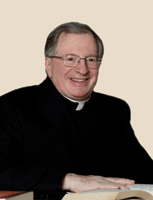George Weigel and I appeared on the same platform together last week at Creighton University in Omaha, Neb. Over the years we have sparred across think-tank seminar tables and in the pages of journals like America, especially over the interpretation of the just war tradition. The topic for our joint appearance in Omaha was “The Challenge of Peace: 25 Years Later,” a look back at the U.S. bishops’ 1983 peace pastoral and the subsequent development of Catholic teaching and advocacy on issues of peace and war.
Mr. Weigel’s critique of the pastoral letter focused primarily on its formulation of issues in the narrow terms of arms control rather than in the broader geopolitical context of the struggle for liberty in eastern Europe, a contest he chronicled in his book The Final Revolution, an account of the nonviolent campaign for workers’ rights and democracy in Poland. In the end, what had been booked as a debate turned out to be a conversation. For I had tried, in the opening of my talk, to show the shift in Catholic social teaching away from just war and toward nonviolence. The church’s official teaching now embraces what I call a composite position: nonviolence but when that fails, just war–—the justified, limited and accountable use of force.
Mr. Weigel and I agreed even on the abolition of nuclear weapons as a goal of foreign military policy and nonproliferation as a challenge of the day, with Weigel citing the Kissinger-Nunn-Perry-Schultz proposal for a nuclear-free world and me, for my part, quoting the bishops’ 1993 statement The Harvest of Justice Is Sown in Peace, which called for the abolition of nuclear weapons as a policy goal.
What tension there was in the auditorium came not from us speakers, as it turned out, but from the audience. I was repeatedly asked why the bishops are not more prophetic. George pointed out that in our individualistic, hedonistic culture, they are prophetic on issues relating to the beginning and end of life. In 1983, of course, The Challenge of Peace was viewed as prophetic, because it was an open challenge to the nuclear war-fighting policies of the Reagan administration. The bishops’ 1986 pastoral letter, Economic Justice for All, was also considered prophetic. But why do the bishops today not seem prophetic on issues other than abortion, euthanasia and stem-cell research?
One major reason is the media. The drafting of The Challenge of Peace and Economic Justice for All was a public affair, with early texts disseminated for public input. Later public acceptance of those texts was due in large part to the wide public discussion they had received. In choosing to draft their statements in more controlled circumstances, with diverse but much smaller input from outside, the bishops have sacrificed the free publicity they received in the mid-80s. As a result, much of the good work the conference does on such issues as torture, peacemaking and the environment just does not get covered.
Furthermore, among many who would press the bishops to be “more prophetic,” there are expectations about prophecy that are unrealistic, especially when directed to the conference of bishops. Bishops are primarily pastors, not prophets; and especially when they are gathered in large numbers, as the U.S. conference is, they will tend to act pastorally, attending to the spiritual needs of a diverse community. Being prophetic, by contrast involves confrontation and risks producing division. A small bishops’ conference, like Guatemala’s, may be prophetic. Because there can be more cohesion and trust in a smaller group, it can be more deliberate and concerted in the policies it pursues.
Finally, expectations of prophecy assume that morality and even policy can be stated in absolute, black-and-white terms. A composite position on nonviolence and the just war, like that of the U.S. bishops and the Vatican, tends to disappoint radicals on both sides, pacificists and just warriors alike. The Harvest of Justice Is Sown in Peace made an important contribution by affirming that nonviolence should shape our public institutions, employing preventive diplomacy, threat reduction centers, conflict transformation measures and so on. But there has been little effort to institutionalize nonviolence this way. Romanticism about nonviolence as a lonely, personal vocation has blocked the Catholic social imagination from promoting new social inventions for peace. There are times when lonely prophecy is necessary; but at others a narrow prophetic style can impede the path to peace.








